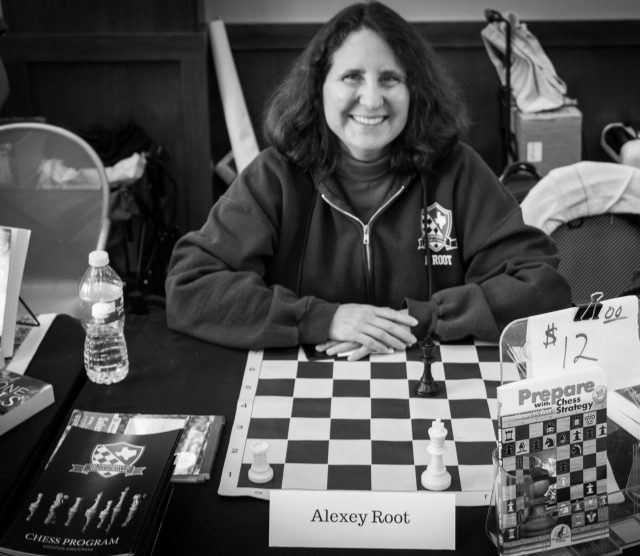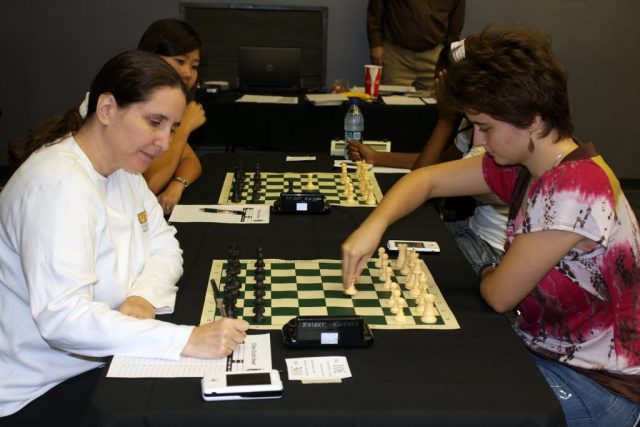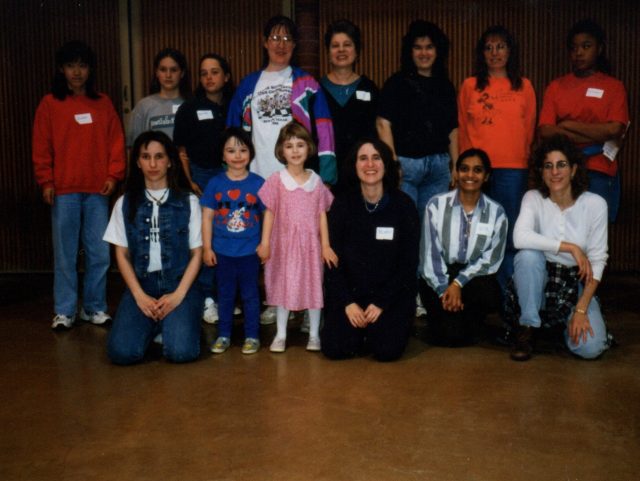WIM Alexey Root is one of ten women pre-registered for the Texas Women’s Chess Championship (June 23-34). The event, open to women 16 and older, features a free banquet meal and entry fee. Find out more on the official registration link Dr. Root, a former US Women’s Champion, author and frequent contributor to Chess Life Magazine and US Chess News, talks about the two major steps that she took to get her in shape for a comeback.
My last tournament was in 2015. Before that, I had not played since 2009. My focus has been on others’ chess games. I analyze games for my online students, write chess articles, and teach chess at summer camps. But for June 23-24, my focus will be on my chess games. So I have taken the following two steps to reactivate my chess-playing brain.
Part I: King, Knight, and Bishop
First, I learned the king, bishop, and knight checkmate, a checkmate highlighted in the acceptance speech of the 2017 Chess Educator of the Year, Grandmaster Andy Soltis. As I reported in the June 2017 issue of Chess Life magazine, “Soltis’ first chess example was the king, bishop, and knight checkmate. . . .When students master that checkmate, they know that they learned something that day.” I paid attention during Soltis’s lecture, but apparently listening alone is not enough for me to succeed. I still couldn’t complete the checkmate in online practice. If you want to try, here is a link.
In the 2018 US Chess Championship, Grandmaster Ray Robson defeated Grandmaster Varuzhan Akobian with the king, bishop, and knight checkmate.
[pgn] [Event "US Championship"] [Site "St Louis, MO USA"] [Date "2018.04.26"] [White "Ray Robson"] [Black "Varuzhan Eduardovich Akobian"] [Result "1-0"] [ECO "C11"] [WhiteElo "2660"] [BlackElo "2647"] [PlyCount "287"] [EventDate "2018.04.18"] 1. e4 e6 2. d4 d5 3. Nc3 Nf6 4. e5 Nfd7 5. f4 c5 6. Nf3 Nc6 7. Be3 Qb6 8. Na4 Qa5+ 9. c3 c4 10. b4 Qc7 11. Be2 Be7 12. O-O O-O 13. Qd2 f5 14. exf6 Nxf6 15. Qc2 b6 16. Ne5 Bb7 17. Nb2 b5 18. a4 a6 19. Bf3 Bd6 20. Rae1 Ne7 21. a5 Nf5 22. Nd1 Ne4 23. Bc1 Qe7 24. g3 Rad8 25. Bg4 Ba8 26. Nf2 Nxc3 27. Bxf5 exf5 28. Qxc3 Bxb4 29. Qb2 Bxe1 30. Rxe1 b4 31. Ned3 Qc7 32. Nxb4 Qxa5 33. Bd2 Qb5 34. Qa1 a5 35. Nc2 a4 36. Nd1 Qb3 37. Nce3 Rb8 38. Nc3 Qb2 39. Qxb2 Rxb2 40. Bc1 Rb3 41. Nxa4 Bc6 42. Nc5 Rb1 43. Kf2 g6 44. Nc2 Ra8 45. Ba3 Rxe1 46. Kxe1 Kf7 47. Kd2 h6 48. h4 Kf6 49. Bb2 Rb8 50. Bc3 Rb1 51. Nb4 Ba8 52. Nca6 Rg1 53. Nc7 Bb7 54. Nbxd5+ Bxd5 55. Nxd5+ Kf7 56. Ne3 Rxg3 57. d5 g5 58. hxg5 hxg5 59. fxg5 Rxg5 60. Be5 Ke7 61. Bf4 Rh5 62. Nxc4 Rh3 63. Ke2 Rc3 64. Ne3 Kf6 65. Bd6 Rb3 66. Kf3 Rd3 67. Bc7 Rd4 68. Bd8+ Ke5 69. Bc7+ Kf6 70. Bb6 Ra4 71. Bd8+ Ke5 72. Bc7+ Kf6 73. Bf4 Rd4 74. Bg3 Ra4 75. Bh2 Rd4 76. Bc7 Ra4 77. Bd6 Rd4 78. Bc7 Ra4 79. Ng2 Rc4 80. Bb8 Rb4 81. Bc7 Rc4 82. Bg3 Rd4 83. Ne3 Ra4 84. Bd6 Rd4 85. Ba3 Ra4 86. Bb2+ Kg6 87. Be5 Ra3 88. Ke2 Kf7 89. Nc4 Ra4 90. Kd3 Ra2 91. Kd4 Rf2 92. Bg3 Rg2 93. Bf4 Re2 94. Kc5 Kf6 95. Be5+ Ke7 96. Bg3 Rc2 97. Kd4 Re2 98. Ne3 Rd2+ 99. Ke5 Re2 100. Bf4 Kd7 101. Kxf5 Rd2 102. Ke5 Re2 103. Kd4 Rf2 104. Be5 Rd2+ 105. Kc5 Re2 106. Nc4 Rc2 107. Bf4 Rc3 108. Kd4 Rb3 109. Kc5 Rc3 110. Kb4 Rh3 111. Nb6+ Ke7 112. Bc7 Rh1 113. d6+ Ke6 114. d7 Rb1+ 115. Kc3 Rd1 116. d8=Q Rxd8 117. Bxd8 Kd6 118. Kd4 Kc6 119. Nc4 Kd7 120. Bg5 Kc6 121. Bf4 Kb7 122. Kd5 Ka7 123. Kc6 Ka8 124. Be3 Kb8 125. Nd6 Ka8 126. Nb5 Kb8 127. Nc7 Kc8 128. Ba7 Kd8 129. Nd5 Ke8 130. Kd6 Kf7 131. Ne7 Kf6 132. Be3 Kf7 133. Bg5 Ke8 134. Nc6 Kf7 135. Ne5+ Ke8 136. Ke6 Kf8 137. Kd7 Kg7 138. Ke7 Kg8 139. Bh6 Kh7 140. Bf8 Kg8 141. Ng4 Kh7 142. Kf7 Kh8 143. Bg7+ Kh7 144. Nf6# 1-0[/pgn]After watching that game, I then watched YouTube videos of how to complete the mate, then practiced the mate online many times. I even wrote about how to complete this checkmate, in this SparkChess article. Knowing how to win this endgame now encourages me, as more than 35 years ago I drew a tournament game with king, bishop, and knight versus a lone king. Part II: Tactics, Tactics, Tactics My second step to prepare for the Texas Women’s is to study tactics. A Facebook comment claimed that the current US Women’s Champion, Nazi Paikidze, solves “at least 100” Chess.com Tactics Trainer problems each day. (The comment was not made by Paikidze.) After reading that comment, I decided that solving five Chess.com tactics in a row would be my daily goal. Sometimes I get four tactics right in a row and then miss one. So then I start all over with my five-in-a-row goal. Before I make my first move on a Tactics Trainer problem, I repeat to myself “Don’t move until you see it.” I am channeling the climactic scene in the film Searching for Bobby Fischer. My chosen move may be a check (with one forced response) or it may win material, for example by pinning a piece. And I’ve usually seen one move beyond my first move. Take a look at this problem, where White has just played 1. Ke3 and you (Black) are to move: Before I made my first move, I saw that 1…exf4+ was a forcing check. That is, being in check, my opponent did not have time to do anything to me. White’s only response, as I predicted, was 2. Rxf4. Then, having planned ahead due to my “Don’t move until you see it” motto, I quickly played 2…Bg5, to pin the rook. When I first calculated, before playing 1…exf4+, 2…Bg5 seemed like a good-enough move. “Pin it and win it” is a common chess strategy. However, by settling for a pin, I missed the much better move of 2….Qe2# and got the problem wrong. After 2…Bg5 there is 3. Rb8+ and White plays on for a few more moves. The mistake of playing a “good-enough move” instead of finding the best one, such as pinning rather than checkmating, is called the Einstellung effect. As the linked article states, the Einstellung effect is “the brain’s tendency to stick with solutions it already knows rather than look for potentially superior ones. Experiments have shown that this cognitive bias literally changes how even expert chess players see the board in front of them.” To counter this effect, I cannot be like the movie character Josh Waitzkin, instantly whipping out 12 moves of pre-calculated brilliance. After each of my opponent’s moves, I must pause and recalculate, to make sure I didn’t overlook better moves. How I’m training now, with Chess.com, is much different than how I prepared for my previous women’s tournaments in Texas. In 1998, I organized the Region 10 Women’s Chess Championship, during which I also offered a free children’s non-rated chess tournament and gave a simultaneous chess exhibition (a “simul”). The local newspaper (Denton Record-Chronicle) ran a front-page story before the tournament and a full page of photos post-tournament. The Texas Woman’s University newspaper and community newspapers ran stories too. By seeking press coverage, and by renting the 9,000-square-foot Denton Civic Center for the day of chess, I hoped to bring attention to chess generally and to women in chess in particular. In 1998, when I was not playing my tournament games or giving my simul, I entertained my five-year-old daughter Clarissa and her friend Katie. I still won all my tournament games (even without chess preparation) because, in 1998, I was the top-rated woman in Texas. The next highest-rated player in my women’s tournament was rated 1276, 800 points below my rating at the time. At my next women’s tournament in Texas, however, I was out-rated. Therefore, I should have prepared. But I did not, as my focus was on my travel companions. In 2008, I drove three UT Dallas chess team women six hours to Lubbock, so we could compete in the Texas Women’s Championship at Texas Tech. I was the only authorized driver, per UT Dallas rules. I also was in charge of all other travel logistics. When I played against Woman Grandmaster Sabina Foisor in round 1, I realized that I didn’t even know how to use a MonRoi. That was especially embarrassing, as I write a blog at the MonRoi Web site. Before 2008, when I did prepare for tournaments, I did so from books. For example, I highlighted pages featuring my favorite openings in the second edition of Batsford Chess Openings. I might review my trusted Batsford opening lines again a couple days before the Texas Women’s. In 2008, I first logged into Chess.com. And, in 2009, I tried Chess.com’s Tactics Trainer. Unfortunately, when I went over 2400 in Chess.com’s tactics rating system, I rested on what is, for me, a very high rating. Returning to Tactics Trainer in mid-May of 2018, I hit a Chess.com rating low of 1886. Now I seem to be creeping back toward expert level with my “five-in-a-row” routine. In the next article, I will share if I played like a US Chess rated expert at the Texas Women’s Chess Championship. Find a list of upcoming Women’s Events https://new.uschess.org/community/womenevents/ on the US Chess’s women’s initiative page, including the US Women’s Open on June 20-21, part of the Las Vegas International Chess Festival. Alexey Root is a Woman International Master who was the 1989 U.S. Women's chess champion. You can find her books on US Chess Sales and on Amazon.com. Her chess.com handle is childrenandchess.
Categories
Archives
- December 2025 (26)
- November 2025 (29)
- October 2025 (39)
- September 2025 (27)
- August 2025 (29)
- July 2025 (43)
- June 2025 (25)
- May 2025 (24)
- April 2025 (29)
- March 2025 (29)
- February 2025 (20)
- January 2025 (24)
- December 2024 (34)
- November 2024 (18)
- October 2024 (35)
- September 2024 (23)
- August 2024 (27)
- July 2024 (44)
- June 2024 (27)
- May 2024 (31)
- April 2024 (51)
- March 2024 (34)
- February 2024 (25)
- January 2024 (26)
- December 2023 (29)
- November 2023 (26)
- October 2023 (37)
- September 2023 (27)
- August 2023 (37)
- July 2023 (47)
- June 2023 (33)
- May 2023 (37)
- April 2023 (45)
- March 2023 (37)
- February 2023 (28)
- January 2023 (31)
- December 2022 (23)
- November 2022 (32)
- October 2022 (31)
- September 2022 (19)
- August 2022 (39)
- July 2022 (32)
- June 2022 (35)
- May 2022 (21)
- April 2022 (31)
- March 2022 (33)
- February 2022 (21)
- January 2022 (27)
- December 2021 (36)
- November 2021 (34)
- October 2021 (25)
- September 2021 (25)
- August 2021 (41)
- July 2021 (36)
- June 2021 (29)
- May 2021 (29)
- April 2021 (31)
- March 2021 (33)
- February 2021 (28)
- January 2021 (29)
- December 2020 (38)
- November 2020 (40)
- October 2020 (41)
- September 2020 (35)
- August 2020 (38)
- July 2020 (36)
- June 2020 (46)
- May 2020 (42)
- April 2020 (37)
- March 2020 (60)
- February 2020 (38)
- January 2020 (45)
- December 2019 (34)
- November 2019 (35)
- October 2019 (42)
- September 2019 (45)
- August 2019 (56)
- July 2019 (44)
- June 2019 (35)
- May 2019 (40)
- April 2019 (48)
- March 2019 (61)
- February 2019 (39)
- January 2019 (30)
- December 2018 (29)
- November 2018 (51)
- October 2018 (45)
- September 2018 (29)
- August 2018 (49)
- July 2018 (35)
- June 2018 (31)
- May 2018 (39)
- April 2018 (31)
- March 2018 (26)
- February 2018 (33)
- January 2018 (30)
- December 2017 (26)
- November 2017 (24)
- October 2017 (30)
- September 2017 (30)
- August 2017 (31)
- July 2017 (28)
- June 2017 (32)
- May 2017 (26)
- April 2017 (37)
- March 2017 (28)
- February 2017 (30)
- January 2017 (27)
- December 2016 (29)
- November 2016 (24)
- October 2016 (32)
- September 2016 (31)
- August 2016 (27)
- July 2016 (24)
- June 2016 (26)
- May 2016 (19)
- April 2016 (30)
- March 2016 (36)
- February 2016 (28)
- January 2016 (32)
- December 2015 (26)
- November 2015 (23)
- October 2015 (16)
- September 2015 (28)
- August 2015 (28)
- July 2015 (6)
- June 2015 (1)
- May 2015 (2)
- April 2015 (1)
- February 2015 (3)
- January 2015 (1)
- December 2014 (1)
- July 2010 (1)
- October 1991 (1)
- August 1989 (1)
- January 1988 (1)
- December 1983 (1)










